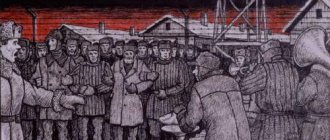ST 141 of the Criminal Code of the Russian Federation.
1. Obstructing the free exercise by a citizen of his electoral rights or the right to participate in a referendum, national vote, violating the secrecy of voting, as well as obstructing the work of election commissions, referendum commissions or the activities of a member of an election commission, referendum commission related to the performance of his duties, -
shall be punishable by a fine in the amount of up to eighty thousand rubles, or in the amount of the wages or other income of the convicted person for a period of up to six months, or by compulsory labor for a term of up to three hundred sixty hours, or by corrective labor for a term of up to one year.
2. The same acts:
a) connected with bribery, deception, coercion, use of violence or the threat of its use;
b) committed by a person using his official position;
c) committed by a group of persons by prior conspiracy or by an organized group, -
shall be punishable by a fine in the amount of one hundred thousand to three hundred thousand rubles, or in the amount of the wages or other income of the convicted person for a period of one to two years, or by compulsory labor for a term of up to four hundred eighty hours, or by corrective labor for a term of up to two years, or by forced labor. labor for a term of up to five years, or arrest for a term of up to six months, or imprisonment for a term of up to five years.
3. Interference, through the use of official or official position, in the exercise by an election commission, referendum commission of its powers established by the legislation on elections and referendums, in order to influence its decisions, namely, a requirement or instruction of an official on the issues of registration of candidates, lists of candidates, vote counting voters, referendum participants, participants in the all-Russian vote and on other issues falling within the exclusive competence of the election commission, referendum commission, as well as unlawful interference in the work of the State Automated System of the Russian Federation “Elections” -
shall be punishable by a fine in the amount of two hundred thousand to five hundred thousand rubles, or in the amount of the wages or other income of the convicted person for a period of one to three years, or by forced labor for a term of up to four years, or by imprisonment for a term of up to four years with a fine in the amount of up to eighty thousand rubles or in the amount of wages or other income of the convicted person for a period of up to six months or without it.
Commentary to Art. 141 Criminal Code
1. The objective side (part 1) is characterized by alternatively provided actions.
Obstruction by a citizen of the free exercise of his voting rights or the right to participate in a referendum can be expressed in illegal obstruction of the exercise of both active (for example, refusal to include a citizen in electoral lists, referendum lists, refusal to issue an absentee certificate, etc.) and passive electoral rights or the right to participate in a referendum (for example, refusal to accept documents for nominating a candidate, cancellation of candidate registration, etc.).
Violation of the secrecy of voting should be understood as control or the possibility of control over the will of a citizen (for example, the absence of voting booths, numbering of ballots, etc.).
Obstruction of the activities of a member of an election commission or a referendum commission related to the performance of his duties may occur in relation to a member of the relevant commission with both a casting and an advisory vote.
2. Part 3 provides for liability for interference, through the use of official or official position, in the exercise by an election commission or referendum commission of its powers established by the legislation on elections and referendums. An exhaustive list of actions recognized as such interference is indicated in the article; and for unlawful interference in the work of the State Automated System of the Russian Federation “Elections”.
Article 141. Obstruction of the exercise of electoral rights or the work of election commissions
Article 141. Obstruction of the exercise of electoral rights or the work of election commissions
[Criminal Code] [Special Part] [Section VII] [Chapter 19]
. Obstructing the free exercise by a citizen of his electoral rights or the right to participate in a referendum, violating the secrecy of voting, as well as obstructing the work of election commissions, referendum commissions or the activities of a member of an election commission, referendum commission related to the performance of his duties -
shall be punishable by a fine in the amount of up to eighty thousand rubles, or in the amount of the wages or other income of the convicted person for a period of up to six months, or by compulsory labor for a term of up to three hundred sixty hours, or by corrective labor for a term of up to one year.
. Same actions:
- a) connected with bribery, deception, coercion, use of violence or the threat of its use;
- b) committed by a person using his official position;
- c) committed by a group of persons by prior conspiracy or by an organized group, -
- shall be punishable by a fine in the amount of one hundred thousand to three hundred thousand rubles, or in the amount of the wages or other income of the convicted person for a period of one to two years, or by compulsory labor for a term of up to four hundred eighty hours, or by corrective labor for a term of up to two years, or by forced labor. labor for a term of up to five years, or arrest for a term of up to six months, or imprisonment for a term of up to five years.
. Interference, through the use of official or official position, in the exercise by an election commission, referendum commission of its powers established by the legislation on elections and referendums, in order to influence its decisions, namely, a requirement or instruction of an official on the issues of registration of candidates, lists of candidates, counting votes, referendum participants and on other issues falling within the exclusive competence of the election commission, referendum commission, as well as unlawful interference in the work of the State Automated System of the Russian Federation “Elections” -
shall be punishable by a fine in the amount of two hundred thousand to five hundred thousand rubles, or in the amount of the wages or other income of the convicted person for a period of one to three years, or by forced labor for a term of up to four years, or by imprisonment for a term of up to four years with a fine in the amount of up to eighty thousand rubles or in the amount of wages or other income of the convicted person for a period of up to six months or without it.
Second commentary to Art. 141 of the Criminal Code of the Russian Federation
1. The object of the crime is the right of citizens of the Russian Federation to elect and be elected to government bodies and local government bodies, as well as to participate in a referendum, guaranteed by Part 2 of Art. 32 of the Constitution of the Russian Federation.
2. The objective side of this crime is expressed in a variety of the following actions (inactions): a) preventing a citizen from freely exercising his voting rights or the right to participate in a referendum; b) violation of the secrecy of voting; c) obstructing the work of election commissions, commissions for holding a referendum (the content of electoral rights and the procedure for organizing elections and holding a referendum are determined in a number of federal laws of the Russian Federation); d) obstructing the activities of a member of an election commission, a referendum commission related to the performance of his duties.
The crime is considered completed from the moment of commission of the provisions specified in the disposition of Part 1 of Art. 141 of the Criminal Code of actions (inaction) regardless of the occurrence of the consequences to which they were aimed.
3. The subject of a crime under Part 1 of Art. 141 of the Criminal Code is a private person who has reached the age of 16 years.
4. The subjective side of this crime (including in aggravating circumstances provided for in Part 2 of Article 141 of the Criminal Code) is characterized by direct intent.
5. Part two of this article provides for liability for this crime committed under the aggravating circumstances specified in it. In this case, bribery as a method of obstruction may consist in the transfer or promise to transfer money or other valuables, or the promise to provide other property benefits; deception - in misleading citizens of the Russian Federation regarding the place and time of voting, the procedure for filling out a ballot, information about candidates, etc.; violence is understood as any physical influence that interferes with the work of election commissions or referendum commissions, and threat is understood as mental influence that can interfere with the exercise of the right to vote or participation in the work of these commissions. This is a threat of violence against the person of the victim or his relatives.
The concept of using one’s official position should be interpreted based on the notes to Art. 201 and 285 of the Criminal Code.
The concept of committing by a group of persons by prior conspiracy or by an organized group is given in Part 2 and Part 3 of Art. 35 of the Criminal Code.
6. Part 3 of the article in question of the Criminal Code of the Russian Federation provides for liability for interference using the subject’s official or official position.
Judicial practice under Article 141 of the Criminal Code of the Russian Federation
Appeal ruling of the Judicial Collegium for Administrative Cases of the Supreme Court of the Russian Federation dated September 11, 2019 N 117-APA19-12
Rejecting the above arguments of O.A. Dronova, the court rightfully proceeded from the fact that by virtue of Part 1 of Article 141, Part 1 of Article 142 of the Criminal Code The following crimes are recognized in the Russian Federation: obstruction of a citizen’s free exercise of his electoral rights, falsification of election documents, referendum documents, if this act was committed by a member of an election commission, a referendum commission, an authorized representative of an election association, a group of voters, an initiative group for a referendum, another group of referendum participants, as well as the candidate or his authorized representative.
Objective side
An act, the specifics of which are enshrined in the provisions of Article 141 of the Criminal Code of the Russian Federation, has several ways of manifestation in the external environment. Obstruction of the exercise of electoral rights includes several actions that will form part of this crime. Moreover, it is important to note that optional features can play a role only in the case of determining time.
So, what will be the objective side of the act provided for in Art. 141 of the Criminal Code of the Russian Federation? This includes not only the creation of obstacles for citizens in matters of electoral law, but also the violation of the secrecy of voting, the work of the commission and its members, that is, everything that is related to the implementation of the right in question.
A mandatory feature is the type of crime. In this case, it is defined as formal, that is, the onset of negative consequences and their connection with the act itself do not matter; it is enough to start performing one of the actions listed above, and criminal prosecution will not take long.
Corpus delicti. An object
Creating obstacles to the exercise of voting rights is an act that encroaches on very important and even specific relationships in society. All interests and freedoms of citizens are established by the Constitution of the Russian Federation. The provisions of Article 141 of the Criminal Code of the Russian Federation protect these areas. Accordingly, the object of the crime is determined precisely in accordance with the basic law of the state.
So, what does the subject of the crime encroach on when he interferes with the exercise of the right to vote? The object is social relations that are formed in the process of realizing all constitutional interests and freedoms. That is, these are rights enshrined in the fundamental law and are the basis for everything in the functioning of society. An additional object is usually not defined in this crime.
Subjective side
What is wine? This is the mental and psychological attitude of the subject of the act to what he did and to the consequences that occurred as a result. It is this that determines the subjective side and is a mandatory feature. No guilt - no crime. Also in some cases, motives and goals play a role, acting as optional features.
Guilt, as is known, has two forms of manifestation: intent and negligence, which, in turn, are divided into subtypes. In the case of Article 141 of the Criminal Code of the Russian Federation, the subject always carries out actions with direct intent. That is, he realizes that he is preventing another person from exercising his right to vote and wants any negative consequences to occur, knowing that they must certainly occur.
Judicial practice: sentences and punishment under Art. 141 of the Criminal Code of the Russian Federation
- Resolution of the Plenum of the Supreme Court of the Russian Federation dated... PLENARY OF THE SUPREME COURT OF THE RUSSIAN FEDERATION DECISION dated December 27, 2002 N 29 ON JUDICIAL PRACTICE IN CASES OF THEFT,...
- Resolution of the Plenum of the Supreme Court of the Russian Federation dated... PLENARY OF THE SUPREME COURT OF THE RUSSIAN FEDERATION DECISION of November 15, 2021 N 48 ON THE PRACTICE OF APPLICATION BY COURTS OF LEGISLATION GOVERNING FEATURES...
- Decision of the Supreme Court: Determination N 203-APU17-21... THE SUPREME COURT OF THE RUSSIAN FEDERATION Case No. 203-APU17-21 APPEAL DECISION Moscow August 31, 2021 Judicial Collegium for Military Personnel of the Supreme...
- Resolution of the Presidium of the Supreme Court of the Russian Federation dated... PRESIDIUM OF THE SUPREME COURT OF THE RUSSIAN FEDERATION DECISION dated December 5, 2018 N 126-P18 ON RESUMING PROCEEDINGS IN THE CASE DUE TO NEW...
- Resolution of the Plenum of the Supreme Court of the Russian Federation dated... PLENAUM OF THE SUPREME COURT OF THE RUSSIAN FEDERATION DECISION dated June 25, 2021 N 18 ON JUDICIAL PRACTICE IN CASES OF CRIMES,...
- Resolution of the Plenum of the Supreme Court of the Russian Federation dated... PLENAUM OF THE SUPREME COURT OF THE RUSSIAN FEDERATION DECISION dated December 17, 2021 N 43 ON SOME ISSUES OF JUDICIAL PRACTICE IN CASES...
- Ruling of the ECtHR dated 02/14/2017 EUROPEAN COURT OF HUMAN RIGHTS THIRD SECTION CASE “MASLOVA VS. RUSSIAN FEDERATION” (Complaint No. 15980/12) JUDGMENT…
- Decision of the Supreme Court: Resolution No. 310P13 dated... DECISION OF THE PRESIDIUM OF THE SUPREME COURT OF THE RUSSIAN FEDERATION Case No. 310-P13 Moscow January 23, 2014 Presidium of the Supreme Court of the Russian Federation...
- Decision of the Supreme Court: Determination No. 56-КГ16-46 dated... THE SUPREME COURT OF THE RUSSIAN FEDERATION No. 56-КГ16-46 DETERMINATION Moscow March 6, 2017 Judicial Collegium for Civil Cases of the Supreme Court...
- Decision of the Supreme Court: Determination No. 56-КГ16-46 dated... THE SUPREME COURT OF THE RUSSIAN FEDERATION No. 56-КГ16-46 DETERMINATION Moscow March 6, 2017 Judicial Collegium for Civil Cases of the Supreme Court...
Qualifying characteristics and responsibilities. Article 141 of the Criminal Code of the Russian Federation
Aggravating circumstances that increase the severity of punishment are recorded in part two and are defined as the commission of an act by a group of persons in the form of a preliminary conspiracy or a special organization, then with bribery, deception or coercion, with threats and violence. All this strengthens the punishment established by Article 141 of the Criminal Code of the Russian Federation. Fraud is also often attributed to this area, but this will be a slightly different qualification.
As for liability under this article, the punishments for this act are very varied. Depending on the severity, they can vary from fines in fairly large amounts to imprisonment. The maximum term for the most severe measure in the form of imprisonment is five years, which refers this crime to the category of medium gravity.
Subject of the crime
A branch such as criminal law establishes general criteria for determining the subject of a socially dangerous act. These include sanity, which is defined as the ability to fully understand actions and, of course, direct them, age, which varies depending on the type of crime and its severity. And of course, the subject is always an individual; a legal entity can only be a victim.
So, what is the subject of the crime provided for in Article 141 of the Criminal Code of the Russian Federation? Comments to it indicate that an act that implies a violation of constitutional law has common criteria. A subject is an individual who has already reached the age of sixteen. Sanity is a mandatory condition and applies to every case.
Part three of the article under consideration fixes a special subject. It says that this act is committed using an official or official position. Qualification under this part of the article is possible only in the case when interference in the work of the election commission is carried out by a citizen who abuses his special powers.



